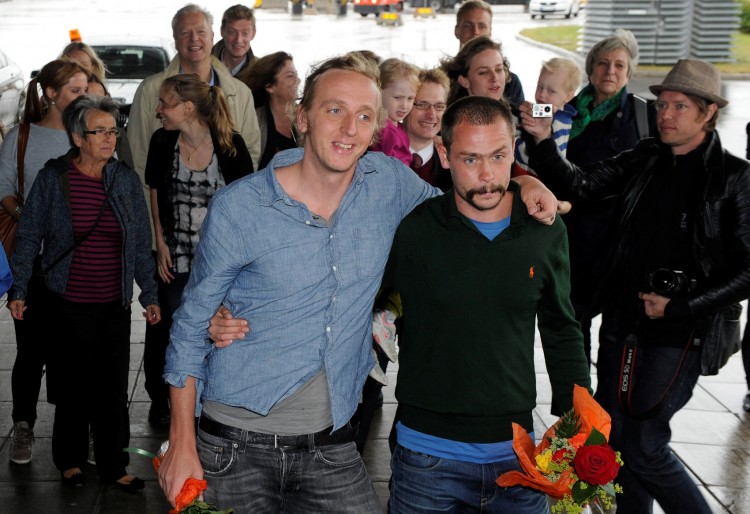After serving 14 months in an Ethiopian prison, Swedish journalists Martin Schibbye and Johan Persson were pardoned and released last week—an ordeal that has made them ever more determined to keep working to uncover human rights violations.
Meanwhile, previously unknown information has now emerged about how the two journalists were subjected to mock executions by Ethiopian authorities and forced to participate in a fabricated propaganda film, which was later used against them in their trial.
At a press conference held Friday, just hours after the journalists’ arrival on Swedish soil, Schibbye said that the strongest feeling of freedom came from being able to speak freely again, rather than having actual physical freedom.
They have now experienced the same kind of rights violations as many of the people they have previously talked to and reported about.
“I’ve reported on journalists being threatened and killed in the Philippines, I’ve seen mass graves of journalists there, and I’ve talked to some of those journalists who have faced that kind of situation, but I’ve never understood what it’s like to work as a journalist in a country where freedom of speech and press is under threat,” Schibbye told Swedish public broadcasting.
He added that having experienced this himself, he can now better understand the people he interviewed in the past. He said he used to think of them as “brave journalists,” but now he better understands the price they pay for their courage, as well as the importance of journalism.
Persson and Schibbye went to the restive Ogaden Province of Ethiopia in June 2011 to investigate the involvement of the Swedish oil company Lundin Petroleum in a conflict between rebels and the central government, but they would return with a very different story.
Ogaden is closed to both journalists and rights groups. The reporters felt that their options were to either travel legally with the Ethiopian military or illegally with the rebel group the Ogaden National Liberation Front (ONLF), declared a terrorist group by the Ethiopian government.
They chose the latter, and after parting ways with the ONLF, they and their security guards were attacked by the Ethiopian military and captured. Both journalists were wounded by gunfire during the attack.
Later, each of them was sentenced to 11 years in prison in an internationally condemned trial for entering the country illegally and violating the anti-terrorist laws by associating with the ONLF.
Schibbye told Sveriges Radio (SR) that while they were in prison, they had been pondering whether or not the whole trip was a failure, now that their article about Ogaden would never be written.
“But then we took on another attitude, ‘We are not prisoners, we are undercover journalists in this prison,’” Schibbye said.
The two constantly talked to other inmates during their time in prison. “We never accepted the role of prisoner, instead we asked ourselves, ‘Okay, so who do we interview today?’ So we have been working on this for 400 days now,” Schibbye told SR.
Persson said in his interview with the Swedish public broadcaster that they had no choice but to go to Ogaden in order to get their story. Books and reports have been written about Ogaden, but as long as no one is able to actually get on the ground and report from there, the oil companies can keep claiming whatever they want about their supposed involvement.
“Martin and I do these kinds of stories, we are old school. We go to the places you need to go to. If you want to write about Ogaden, you had better get over there,” Persson said.
After the Swedes were pardoned, new information, which was previously kept secret to ensure their safety, has been published by Swedish media.
At the press conference, Persson and Schibbye confirmed that they were forced to participate in a fabricated propaganda film. This footage was then used as evidence against them in the subsequent trial.
Schibbye said that they were both wounded, had lost a lot of blood, and were in need of medical care, so they chose to comply and be filmed, but they also decided not to say anything on tape that was not true—despite being constantly pressured to admit to collaborating with terrorists.
They wanted the world to know, through that footage, that they were still alive at the time of their capture. They also confirmed that they had been subjected to mock executions.
A few days after their capture, they were taken into the desert and separated in an attempt to force confessions. Both were told that the other would be shot unless they confessed, and shots were then fired nearby to give the impression that the other had indeed been shot.
Despite their harrowing experience, Persson and Schibbye are more determined than ever to continue their investigative journalism, although they have no plans to return to Ethiopia.
They said at the press conference that they now have a lifetime mission to draw from their experiences while working to uncover human rights abuses.
“We will keep working as usual. We live for this work. As soon as we’ve had some sleep, we'll be right back at it again,” Persson said.
The Epoch Times publishes in 35 countries and in 19 languages. Subscribe to our e-newsletter.






